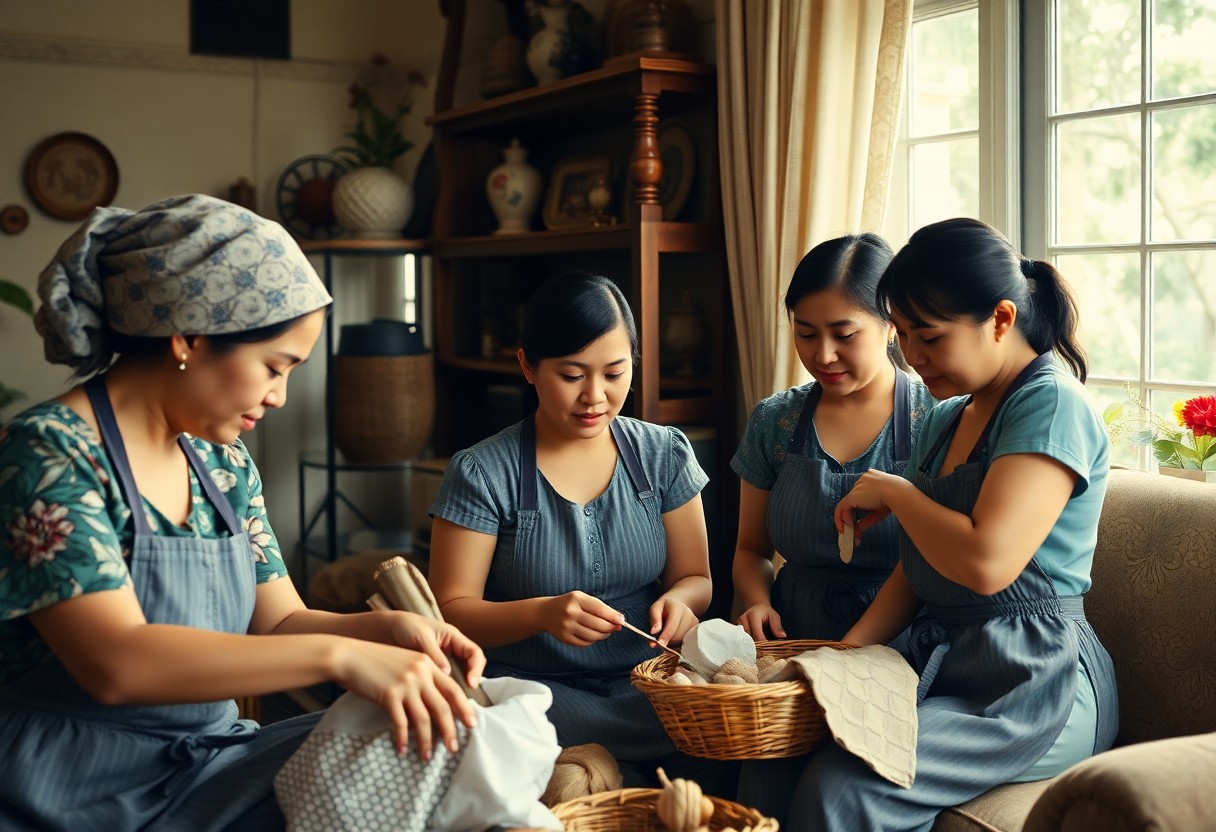Just as the vibrant tapestry of British society has been woven by various cultures, you will discover the significant role of Filipino domestic workers in the UK’s labor landscape. Dating back to the 1970s, these workers have not only filled crucial care roles but also faced harsh working conditions and challenges. Your understanding of their history reveals a journey filled with resilience and contributions that have shaped both the Filipino community and British households alike. Explore this compelling narrative and gain insight into the experiences of Filipino domestic workers in the UK.
Key Takeaways:
- The presence of Filipino domestic workers in the UK began to rise significantly in the 1970s, influenced by global migration trends and economic factors in the Philippines.
- Filipino domestic workers have contributed to the UK’s labor force, often filling roles in households that require caregiving, cleaning, and elderly care services, particularly in affluent areas.
- Issues such as labor rights, exploitation, and the lack of legal protections have been persistent challenges faced by Filipino domestic workers in the UK, prompting advocacy and support initiatives from various organizations.
The Origins of Filipino Migration to the UK
Before the influx of Filipino domestic workers in the UK, there was a significant historical context that shaped their migration.
Historical Context of Filipino Migration
Across the decades, migration from the Philippines began as a response to both domestic and global challenges. Your understanding of this historical backdrop is important for grasping the journey of Filipino migrants who sought opportunities abroad for better living conditions.
Economic and Political Factors
Around the 1970s, the Philippines faced multiple economic and political challenges that prompted many to seek work overseas. The need for jobs, coupled with rising unemployment and political instability, pushed Filipinos to look for opportunities in other countries.
- Unemployment led many to seek work abroad.
- Political instability, particularly during the Marcos regime, made life difficult.
- Opportunities in the healthcare and domestic sectors in the UK attracted many.
Any hope for a better future fueled the desire to migrate.
Political events further compounded these economic factors, leading to an exodus of workers.
- Martial Law declared in 1972 caused widespread fear.
- Exile of activists and professionals resulted in brain drain.
- A lack of government support for workers also sped up migration.
Any desperate conditions led many Filipinos to view migration as a viable path to stability and success.
The Emergence of Domestic Work
One notable aspect of the UK workforce is the role of domestic workers, which has evolved over the years. As the demand for household assistance increased, domestic work became an important occupation for many individuals, particularly for immigrants seeking better opportunities. This role often encompasses a wide range of duties, including childcare, housekeeping, and elderly care, significantly contributing to the well-being of numerous families across the UK.
The Role of Domestic Workers in the UK
Before the influx of Filipino workers, domestic employment primarily comprised British citizens, often women, fulfilling roles within upper-middle-class households. The perception of domestic work was highly gendered, with little recognition of the skill and dedication involved. Over time, as the economy shifted and social norms evolved, the demand for domestic help surged, leading to a diversification of the workforce.
Initial Filipino Involvement in Domestic Work
After the UK entered a phase of economic restructuring in the late 20th century, many Filipino workers emerged as key contributors within the domestic labor sector. Influenced by historical ties and a high level of training in hospitality, you will find that these individuals quickly became known for their reliability and exceptional work ethic, leading to their growing acceptance in households throughout the country.
Work opportunities for Filipino domestic workers began to flourish as the UK realized their potential in providing quality services. You may find that they are often sought after for their strong communication skills and ability to adapt in various household settings. Despite facing documentation challenges and navigating a complex immigration system, many persevered, becoming vital assets within families. As they built a reputation for their dedication, Filipino workers not only improved the lives of the families they served but also empowered their own families back home through remittances, creating a positive impact both locally and globally.
Changing Demographics of Filipino Domestic Workers
Keep in mind that the demographics of Filipino domestic workers in the UK have evolved significantly over the years, shaping the workforce and its dynamics.
Gender Dynamics in Migration Patterns
Around the globe, female migration has dominated the Filipino domestic worker scene, with women making up a majority of this workforce. Your understanding of these patterns highlights the role of women in fulfilling labor demands while also addressing economic needs back home.
Age and Educational Background of Workers
On average, the age of Filipino domestic workers tends to range between 25 to 45 years. Most workers possess a solid educational background, often holding degrees in fields such as nursing, teaching, or hospitality, which enhances their prospects.
At the same time, the age and educational background of Filipino domestic workers play a significant role in their employment experience. Many enter the workforce at a young age, balancing family responsibilities with job requirements. This dual burden can sometimes lead to a lack of access to better job opportunities. Moreover, while your degree may lead to employment in skilled fields, the reality often confines you to domestic duties, showcasing a significant disparity between qualifications and job roles. The high level of education, however, often means you possess transferable skills that can open doors to various opportunities in the future.
Legal Framework and Policies Affecting Filipino Workers
To understand the experiences of Filipino domestic workers in the UK, it’s necessary to examine the legal framework and policies that govern their lives. These laws and regulations shape not only their ability to work but also their overall treatment and rights within the workforce.
Immigration Laws and Their Impact
Policies regarding immigration significantly influence your status as a Filipino domestic worker in the UK. The tightening of immigration laws has made it more difficult for many to obtain necessary visas, often leading to precarious situations where you may find yourself at the mercy of employers without sufficient legal protection.
Employment Rights and Protections
Above all, the employment rights and protections available to you can vary based on your residency status and the specific sector you work in. Unfortunately, many Filipino domestic workers encounter barriers in accessing these rights due to the nature of informal work arrangements.
Laws established in the UK, such as the Employment Rights Act and National Minimum Wage Act, offer key protections, including the right to a minimum wage and protections against unfair dismissal. However, many domestic workers are classified as ‘self-employed’, which can remove these important safeguards. As a result, you may find it challenging to secure fair treatment or to raise concerns regarding your work conditions, placing you in a particularly vulnerable position. Understanding these laws is vital for asserting your rights and ensuring you receive the protections you deserve.
Cultural Contributions of Filipino Domestic Workers
Not only have Filipino domestic workers played a significant role in the labor market, but they have also made substantial cultural contributions to the UK. Their presence has fostered a greater appreciation and understanding of Filipino culture among the British population, all while bridging gaps between different cultural perspectives.
Influence on British Society
Before the arrival of Filipino domestic workers, there was little awareness of the rich traditions and customs of the Philippines. As these workers integrated into British households, you began to notice a gradual influence of Filipino culture, including culinary traditions and festive celebrations, which have enriched the tapestry of British society.
Fusion of Filipino Culture with Local Customs
The blending of Filipino and British cultures extends beyond mere coexistence; it often results in exciting fusions that enhance local customs. For instance, traditional Filipino dishes, such as adobo and lumpia, have found their way into British households, forever altering your dining experiences. Simultaneously, Filipino celebrations like *paskong pinoy* (Filipino Christmas) have introduced unique elements to British holiday traditions, showcasing the vibrant spirit of Filipino culture. This intermingling of cultures inspires creativity, promotes tolerance, and exemplifies how diverse backgrounds can coexist harmoniously, enriching your community.

Challenges Faced by Filipino Domestic Workers
Once again, the plight of Filipino domestic workers highlights the significant challenges they face in the UK. Many of these dedicated individuals encounter a range of obstacles that affect their employment experience and overall well-being.
Working Conditions and Exploitation
Any Filipino domestic worker may find themselves in precarious working conditions, often enduring long hours without sufficient breaks. Sadly, cases of exploitation are alarmingly common, with some workers receiving less than the minimum wage. This vulnerability often stems from a lack of awareness about their rights or fear of losing their jobs.
Issues of Social Integration and Community Support
To a large extent, many Filipino domestic workers struggle with social integration and the lack of community support in the UK. This isolation can lead to feelings of loneliness and discouragement, making it challenging for you to forge connections and build a supportive network.
It is imperative to acknowledge that social integration plays a pivotal role in the well-being of Filipino domestic workers. Many of you may find it difficult to connect with local communities, largely due to cultural differences and language barriers. This disconnection can result in a lack of access to resources and opportunities that could enhance your experience in the UK. Efforts from advocacy groups and local organizations are vital in fostering a sense of belonging and providing guidance, which can significantly improve your quality of life while working abroad.
The Future of Filipino Domestic Workers in the UK
For many Filipino domestic workers in the UK, the future holds both challenges and opportunities. As the landscape of labor migration continues to evolve, increased demand for caregivers and domestic support services is expected to shape new migration patterns. You can anticipate a shift towards more formalized employment structures that may provide enhanced security and benefits for workers, alongside potential regulatory changes aimed at safeguarding their rights.
Trends in Migration and Employment
Workers in the domestic sector will likely see an increase in job openings driven by an aging population and changing family dynamics. This trend presents both opportunities for employment and risks of exploitation. As you navigate this evolving landscape, being informed about your rights will be vital to securing a position that honors your skills and contributions.
Advocacy and Support Organizations
Between grassroots movements and established advocacy groups, several organizations are dedicated to empowering Filipino domestic workers in the UK. These entities work tirelessly to raise awareness about rights and provide vital resources for workers.
Understanding how advocacy and support organizations operate is key to maximizing your potential and enhancing your working conditions. Groups such as the Filipino Domestic Workers’ Organisation (FDWO) and Kalayaan are committed to offering legal support, training, and tools that promote equity and worker rights in domestic employment. You can seek assistance from these organizations not only to defend your rights but also to build a supportive community that celebrates your contributions to society. By staying connected, you can thrive in this dynamic job market.
